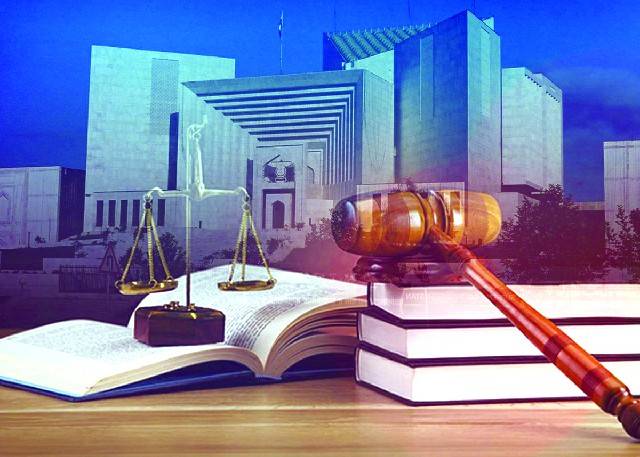
The Judicial Commission of Pakistan (JCP) has recently approved the elevation of an honorable judge Justice Mohammad Ali Mazhar, who was fifth on the seniority list of Sindh High Court to the Supreme Court, by a majority of five to four despite strong reaction from the premier lawyers’ body, the Pakistan Bar Council (PBC). Justice Mazhar has superseded Sindh High Court Chief Justice Ahmed Ali Sheikh, Justice Irfan Sadat Khan, Justice Aqeel Ahmed Abbasi and Justice Hassan Azhar Mirza.
This is not the first time that a junior judge from a high court has been elevated to the SC. Earlier in April 2018, Justice Muneeb Akhtar, who was fourth on the seniority list of the SHC was elevated by following the precedence when two chief justices, namely, Saqib Nisar and Asif Saeed Khan Khosa were elevated to the apex court by ignoring the then Lahore High Court Chief Justice Khawaja Muhammad Sharif.
The legal fraternity is sharply divided on this issue. Some argue that as the SC is the highest court of the country, thus, only ‘competent’ and ‘upright’ judges should be elevated to the SC. They contend that the elevation to the Supreme Court under Article 175-A of the Constitution should be done after weighing the overall antecedents, reputation and expertise in deciding matters, integrity as well as conduct as judge of provincial high courts; that the judges should be elevated considering their ‘vision’ and ‘spirit’; the principle of seniority in the elevation of judges promotes ‘mediocrity.’ According to the apex court ruling in the 2002 Faqir Khokhar case, elevation to the SC is considered a fresh appointment; therefore, any judge even a junior from a high court can be elevated to the Supreme Court. The SC in the case titled Supreme Court Bar Association vs. Federation of Pakistan (PLD 2002 SC 939) held that the scope of the principles of seniority and legitimate expectancy in Al-Jihad Trust and Asad Ali’s cases is restricted to the appointment of the chief justice of a high court and the Chief Justice of Pakistan and these principles neither apply nor can be extended to the appointment of judges of the Supreme court.
On the contrary, it is argued that the principle of seniority must be observed in the elevation of judges to the SC and the method of pick and choose should be avoided to promote merit and transparency in judicial appointments. It may be questioned whether senior judges who are not considered for elevation are not ‘competent’ and ‘upright’! It is contended that the majority decision of SJC is a violation of the Constitution and the seniority principle laid down in the Al-Jihad Trust and Asad Ali cases. The bar councils even observed a ‘black day’ on July 28 to oppose the SJC decision and have called a meeting on August 5 to chalk out a way forward.

If a principle of seniority is violated by the judiciary (i.e., if a junior judge of a high court can be elevated to the highest court of the country while superseding several senior judges) will it not affect the credibility of the judiciary? Would such decisions not be taken as a precedent to violate the principle of seniority by the executive? Would it not weaken the judiciary when it comes to the enforcement of the seniority principle in the promotions of the executive? Would it not make the whole process of appointment and promotions in the government departments a subjective phenomenon?
If it is assumed for the sake of argument that a junior judge is more competent and upright than senior judges, does it not suggest that the senior judges are not that competent and upright? Such assumptions may lead to questioning that how allegedly incompetent persons can be appointed at the first instance or allowed to remain in the judiciary when their ‘competence’ and ‘integrity’ is doubted by no one else but the SJC.
Should SJC not first define a criterion of ‘competence’ and ‘uprightness’ before making any appointment in the superior judiciary? Given the conflicting judgments on the principle of seniority and competing approaches of senior judges of the SC as well as the lawyers, a full bench of the SC may be constituted to settle the issue to make the process of judicial appointments more transparent. In this regard, consultation may be sought from the judiciary, bar councils and the parliament to strengthen our justice system. Until a clearly defined criterion of ‘competence’ and ‘uprightness’ is framed, the SJC may consider following the principle of seniority for appointments in the judiciary. In any case, the process of judicial appointments cannot be left on subjective meaning and interpretation of the words like ‘vision’, ‘spirit’, ‘competence’, ‘uprightness’, and ‘integrity’; the judicial policymakers must provide measurable yardstick to specify the objective meaning of these concepts. Considering the intense atmosphere within the legal fraternity and civil society concerns, the decision of SJC may be reviewed and the process of judicial appointments may be made more transparent.
The writer is an advocate in the Supreme Court of Pakistan.
This is not the first time that a junior judge from a high court has been elevated to the SC. Earlier in April 2018, Justice Muneeb Akhtar, who was fourth on the seniority list of the SHC was elevated by following the precedence when two chief justices, namely, Saqib Nisar and Asif Saeed Khan Khosa were elevated to the apex court by ignoring the then Lahore High Court Chief Justice Khawaja Muhammad Sharif.
The legal fraternity is sharply divided on this issue. Some argue that as the SC is the highest court of the country, thus, only ‘competent’ and ‘upright’ judges should be elevated to the SC. They contend that the elevation to the Supreme Court under Article 175-A of the Constitution should be done after weighing the overall antecedents, reputation and expertise in deciding matters, integrity as well as conduct as judge of provincial high courts; that the judges should be elevated considering their ‘vision’ and ‘spirit’; the principle of seniority in the elevation of judges promotes ‘mediocrity.’ According to the apex court ruling in the 2002 Faqir Khokhar case, elevation to the SC is considered a fresh appointment; therefore, any judge even a junior from a high court can be elevated to the Supreme Court. The SC in the case titled Supreme Court Bar Association vs. Federation of Pakistan (PLD 2002 SC 939) held that the scope of the principles of seniority and legitimate expectancy in Al-Jihad Trust and Asad Ali’s cases is restricted to the appointment of the chief justice of a high court and the Chief Justice of Pakistan and these principles neither apply nor can be extended to the appointment of judges of the Supreme court.
Should SJC not first define a criterion of ‘competence’ and ‘uprightness’ before making any appointment in the superior judiciary?
On the contrary, it is argued that the principle of seniority must be observed in the elevation of judges to the SC and the method of pick and choose should be avoided to promote merit and transparency in judicial appointments. It may be questioned whether senior judges who are not considered for elevation are not ‘competent’ and ‘upright’! It is contended that the majority decision of SJC is a violation of the Constitution and the seniority principle laid down in the Al-Jihad Trust and Asad Ali cases. The bar councils even observed a ‘black day’ on July 28 to oppose the SJC decision and have called a meeting on August 5 to chalk out a way forward.

If a principle of seniority is violated by the judiciary (i.e., if a junior judge of a high court can be elevated to the highest court of the country while superseding several senior judges) will it not affect the credibility of the judiciary? Would such decisions not be taken as a precedent to violate the principle of seniority by the executive? Would it not weaken the judiciary when it comes to the enforcement of the seniority principle in the promotions of the executive? Would it not make the whole process of appointment and promotions in the government departments a subjective phenomenon?
If it is assumed for the sake of argument that a junior judge is more competent and upright than senior judges, does it not suggest that the senior judges are not that competent and upright? Such assumptions may lead to questioning that how allegedly incompetent persons can be appointed at the first instance or allowed to remain in the judiciary when their ‘competence’ and ‘integrity’ is doubted by no one else but the SJC.
Should SJC not first define a criterion of ‘competence’ and ‘uprightness’ before making any appointment in the superior judiciary? Given the conflicting judgments on the principle of seniority and competing approaches of senior judges of the SC as well as the lawyers, a full bench of the SC may be constituted to settle the issue to make the process of judicial appointments more transparent. In this regard, consultation may be sought from the judiciary, bar councils and the parliament to strengthen our justice system. Until a clearly defined criterion of ‘competence’ and ‘uprightness’ is framed, the SJC may consider following the principle of seniority for appointments in the judiciary. In any case, the process of judicial appointments cannot be left on subjective meaning and interpretation of the words like ‘vision’, ‘spirit’, ‘competence’, ‘uprightness’, and ‘integrity’; the judicial policymakers must provide measurable yardstick to specify the objective meaning of these concepts. Considering the intense atmosphere within the legal fraternity and civil society concerns, the decision of SJC may be reviewed and the process of judicial appointments may be made more transparent.
The writer is an advocate in the Supreme Court of Pakistan.

